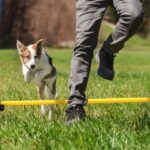Puppy classes anchor the foundation for raising a well-mannered and balanced dog. These early training sessions shape how puppies engage with their surroundings, other dogs, and people. When introduced at the right age, these classes sculpt a puppy’s behavior and guide them toward becoming confident, well-adjusted adults. The skills absorbed during this period mold not only obedience but also shield against behavioral challenges later in life.
Choosing the ideal moment to dive into puppy classes is crucial, as it grants the dog a chance to cultivate social skills and absorb basic commands in a controlled and secure environment.
The Ideal Age to Start Puppy Classes
The prime window for starting puppy classes spans between 8 and 16 weeks. This period pulses with opportunities, as puppies at this age are in a critical stage of socialization, where they embrace new experiences and swiftly learn. It’s during this time that they forge essential social behaviors, which influence how they interact with the world.
Veterinarians advise beginning classes once the puppy has received its first round of vaccinations, typically around 8 weeks. These initial shots safeguard the puppy from common ailments, ensuring a healthy environment for interaction with other dogs and humans. Waiting until these vaccinations are in place creates a safe space for everyone involved.
Benefits of Starting Early
Embarking on puppy classes early unlocks a series of benefits that steer a puppy’s development in the right direction.
Socialization: A key element of early puppy classes lies in socialization. During these sessions, puppies learn to navigate interactions with other dogs, unfamiliar people, and new surroundings. This exposure helps them handle future experiences with ease. A well-socialized puppy is far more likely to grow into an adult dog that approaches new situations with calm curiosity instead of anxiety.
Basic Commands: Early training sets the stage for mastering core commands like sit, stay, and come which are crucial for guard dog breeds like Dobermann Puppies or Rottweilers. These commands act as the building blocks for more advanced training and establish a clear line of communication between puppy and owner. They also build trust, laying the groundwork for a strong bond.
Behavioral Development: Structured learning at a young age helps ward off behavioral issues like aggression, excessive fear, or separation anxiety. By guiding puppies on how to behave in various situations, classes prevent unwanted habits from taking root. A well-run class reinforces good manners and helps owners address typical puppy behavior, like biting or chewing.
What to Expect from Puppy Classes
In a typical puppy class, expect a blend of obedience training, socialization activities, and confidence-boosting exercises. These sessions often begin with fundamental commands like sit, stay, and come, which lay the groundwork for more advanced skills. Instructors rely on positive reinforcement—rewarding puppies with treats or praise for following instructions. This approach nurtures a love for learning and keeps puppies eager to participate.
Socialization forms the heart of these classes. Puppies get to interact with other dogs and people in a controlled setting, learning how to read canine body language and play appropriately. These interactions lower the chances of future fear or aggression when they encounter new environments.
Confidence-building exercises, such as walking on various surfaces or navigating simple obstacles, also play a vital role. These activities help puppies grow accustomed to unfamiliar experiences, fostering emotional resilience and reducing the likelihood of fear-driven behaviors.
Choosing the Right Puppy Class
Selecting the perfect class is crucial to your puppy’s success. Look for a class that emphasizes positive reinforcement techniques, as this method best fosters trust and good behavior. Classes that lean on punishment or negative tactics often leave puppies anxious or fearful, stunting their development.
Class size also holds importance. Smaller groups allow for more personalized attention from the instructor, ensuring that your puppy receives the support they need to thrive. In larger classes, the focus may dilute, slowing your puppy’s progress.
Finding a class that suits your puppy’s temperament is equally essential. Some classes cater to high-energy dogs, while others focus on more timid or cautious pups. Matching the class to your puppy’s personality will make the experience more enjoyable and productive.
Conclusion
Starting puppy classes at the right age delivers lifelong rewards for your dog. Early training and socialization shape a well-mannered, confident adult dog, one that navigates new environments with ease and poise. Enrolling your puppy in classes between 8 and 16 weeks lays the foundation for solid behavior, social skills, and obedience. These lessons go beyond basic commands—they act as a safeguard against potential behavioral issues and help build trust between you and your puppy.





